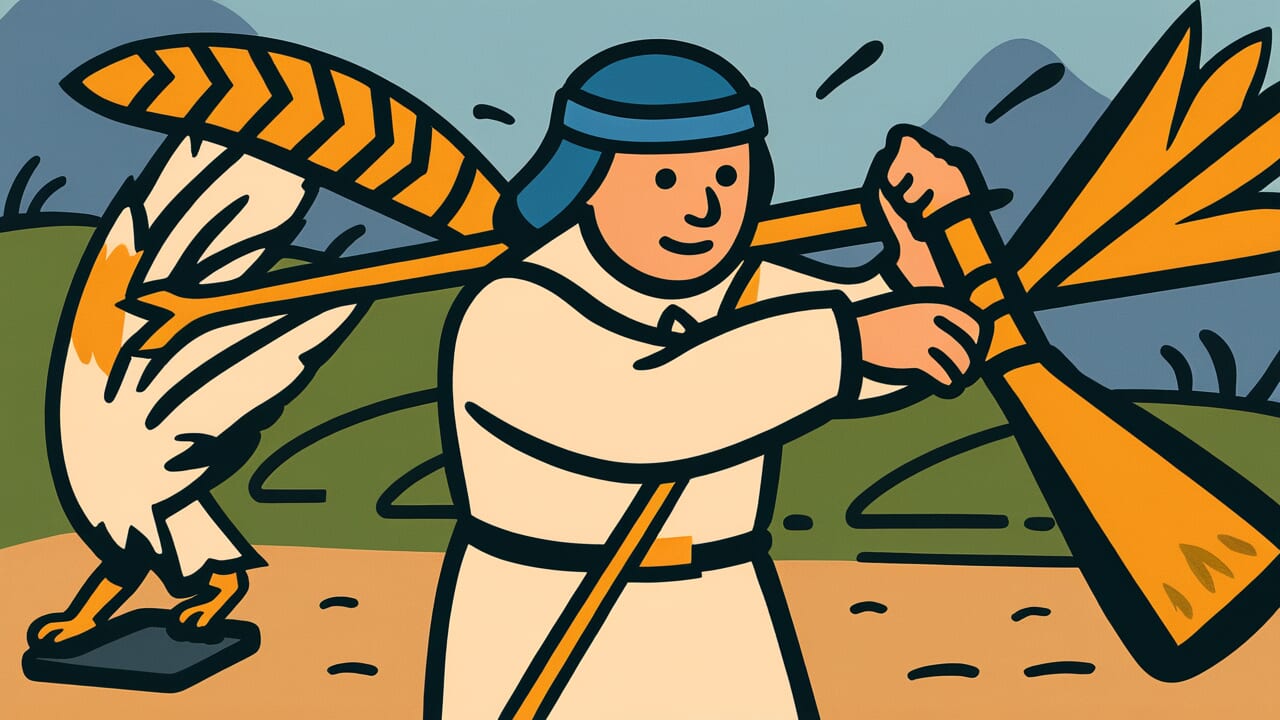How to Read “Fletching arrows after seeing the battle”
Ikusa wo mite ya wo hagu
Meaning of “Fletching arrows after seeing the battle”
“Fletching arrows after seeing the battle” is a proverb that describes rushing to prepare only after trouble has already started.
It criticizes people who begin working on things they should have prepared in advance only when problems appear right in front of them.
This proverb is used to warn against poor preparation and lack of planning.
Opening your textbook for the first time the night before an exam is a perfect example. So is starting to create materials right before an important presentation.
Even in modern society, this saying applies to many situations. People who panic as deadlines approach or think about solutions only after trouble occurs fit this description perfectly.
The proverb uses the life-or-death scenario of battle to make a strong impression. It shows how inefficient and dangerous reactive responses can be.
Origin and Etymology
The word “hagu” in this proverb is an old expression rarely used today.
It means attaching arrowheads and feathers to the bamboo shaft of an arrow. In other words, it refers to the work of completing an arrow.
During the Warring States period and ancient battles, arrows were one of the most important weapons for samurai.
However, making arrows required considerable time and skill. Carefully gluing feathers and firmly attaching arrowheads was not something you could rush through on the battlefield.
This proverb is thought to teach the importance of preparing for battle.
Ideally, warriors should prepare sufficient arrows before battle begins. They should carefully finish each one.
But starting to make arrows only after seeing the enemy appear is obviously too late.
Behind this expression may lie actual stories of samurai who failed because they entered battle unprepared.
Alternatively, it might have used warrior imagery as a warning against people who neglect preparation in daily life.
Either way, it conveys the importance of advance preparation through the tense scenario of battle.
Interesting Facts
Making a single arrow took considerable time even for skilled craftsmen.
They had to select bamboo, dry it, and use hawk or eagle feathers for fletching. Three feathers were glued symmetrically on each arrow.
This work was affected by humidity and temperature. It was not something that could be done suddenly on the battlefield.
Samurai were expected to prepare large quantities of arrows during peacetime.
The number of arrows indicated how well-prepared a warrior was. Therefore, “fletching arrows after seeing the battle” symbolized shameful lack of preparation for a samurai.
Usage Examples
- Starting to gather materials today when the project is due tomorrow is like fletching arrows after seeing the battle
- Running to buy emergency supplies after a typhoon arrives is exactly fletching arrows after seeing the battle—too late
Universal Wisdom
The proverb “Fletching arrows after seeing the battle” teaches us about a fundamental human weakness.
All of us tend not to prepare seriously until we see an imminent crisis approaching.
Why do people neglect advance preparation? Because future crises don’t feel real to us.
Even when we understand intellectually, our hearts don’t truly move until threats appear before our eyes.
This relates to how our brains work. Our minds are designed to prioritize comfort in the present moment.
However, this proverb has been passed down for hundreds of years because our ancestors deeply understood the danger of this human trait.
The habit of postponing preparation sometimes leads to irreversible consequences.
Just as lacking arrows on the battlefield could cost your life, being unprepared in life can be fatal too.
This proverb goes beyond simple time management issues. It teaches the importance of confronting our essential human weaknesses.
Don’t wait until crisis appears to act. Prepare sincerely even for an invisible future.
This wisdom helps people grow and leads to better lives.
When AI Hears This
When self-driving cars navigate sharp curves, two control methods work simultaneously.
One is feedforward control that predicts “there’s a curve ahead” from map data and turns the wheel in advance.
The other is feedback control that corrects course when the car actually starts drifting.
“Fletching arrows after seeing the battle” criticizes relying only on feedback control.
Interestingly, control engineering has mathematically proven that “feedback alone always creates delay.”
Sensors detect situations, computers calculate, and actuators operate. This process inevitably creates delays from tens of milliseconds to several seconds.
In rocket attitude control, this delay becomes fatal. Firing thrusters after detecting tilt may already be too late.
That’s why modern advanced control systems use feedforward control based on predictive models as their main approach.
Feedback is used only for fine adjustments. Industrial robots pre-calculate motion paths and keep actual corrections minimal.
This distribution ratio is generally about 70-30 or 80-20.
Whether on ancient battlefields or in modern control systems, reactive responses have the structural weakness of time delay.
Even accepting imperfect predictions, emphasizing advance preparation is a probabilistically correct strategy.
Lessons for Today
This proverb teaches modern people the importance of “imagination for the invisible future.”
Our daily lives are built from accumulated small choices. Today’s preparation creates tomorrow. This week’s plans shape next month.
Modern society has a strong tendency to demand immediate results.
But truly valuable things are built on steady preparation. Studying for qualifications, health management, building relationships, career development—none happen overnight.
What matters is not moving after crisis appears, but preparing precisely because today is peaceful.
This doesn’t mean preparing out of anxiety. It means preparing as kindness to your future self.
Today’s you helps tomorrow’s you. It’s an act of compassion.
Perfect preparation is difficult, but you can move forward little by little.
Even small steps become great strength when they become habits.
Don’t fletch arrows after seeing battle. Prepare arrows one by one during peaceful days.
This way of living will make your life richer and more secure.



Comments